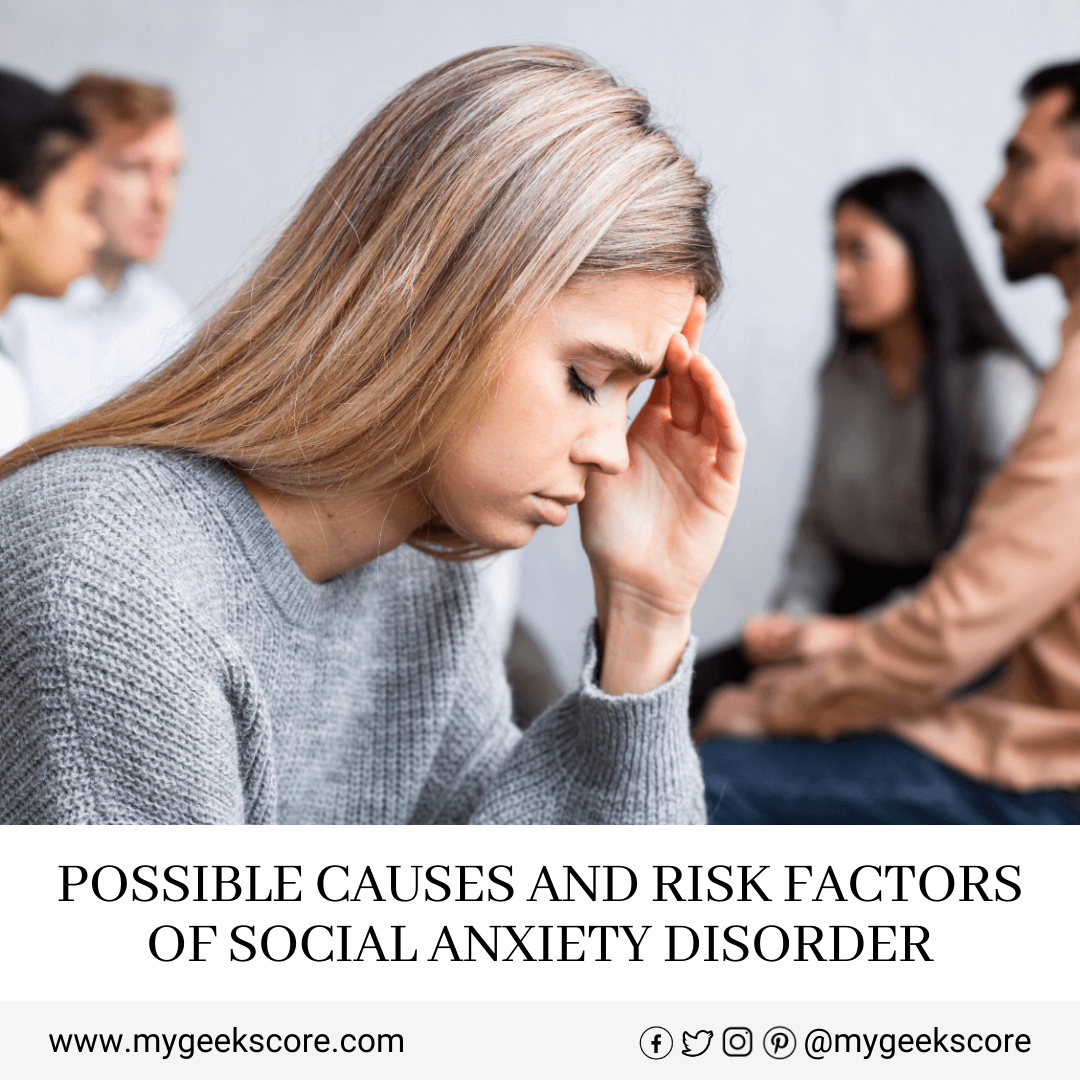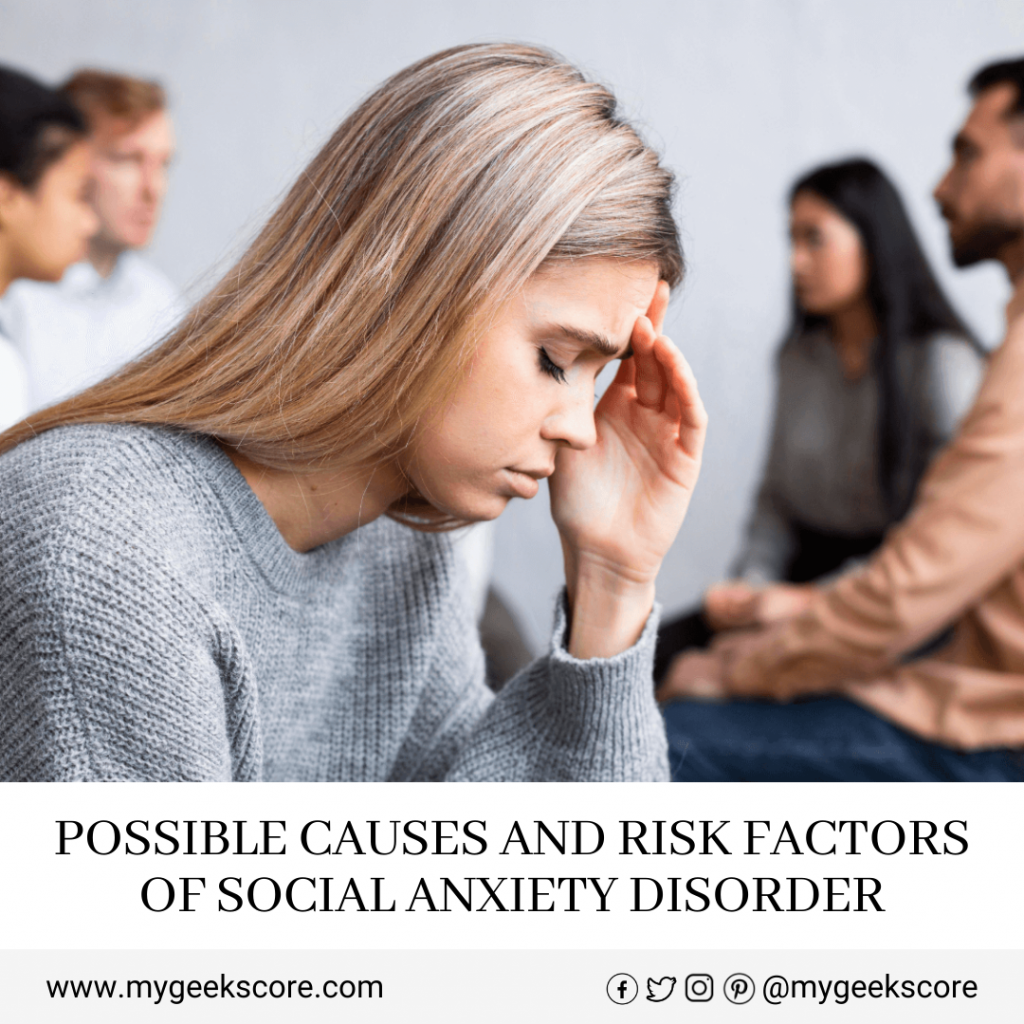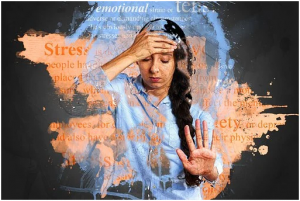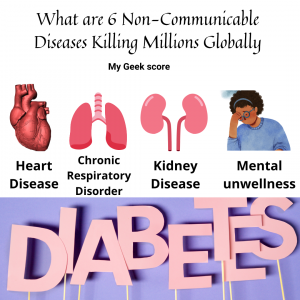Possible Causes And Risk Factors Of Social Anxiety Disorder


My Geek Score: Do you know someone socially awkward or anxious? You probably do. Social Anxiety Disorder, or SAD, is a common mental health issue affecting around 15 million adults in the United States (6.8% of the U.S. population).
The good news is that SAD is treatable, and people can recover from it with the right treatment approach, although many people are afraid to talk about their symptoms.
So, we need to address the problem before it gets out of hand. And understanding what social anxiety disorder is and how it’s treated may help you cope if you are suffering from it.
What is Social Anxiety Disorder?
Social anxiety disorder (SAD) is characterized by an extreme fear of being judged or scrutinized by other people in one or more social situations, leading to a significant amount of distress and problems functioning.
It differs from specific phobias, which involve fear of a more limited set of situations, and other anxiety disorders, where the fear may be unrelated to social circumstances.
What is it like to have Social Anxiety Disorder?
Many people seem to think that social anxiety is just about being shy. That’s not true, though. Shyness is a part of it, but social anxiety is a whole different thing. It’s like having the feeling of patheticness and embarrassment.
Trying to have a conversation with someone when you have social anxiety isn’t easy because you will probably feel like they are judging you and can tell that you have social anxiety.
Those with a social anxiety disorder also fear negative judgment from others. They might feel uneasy around new people, especially if they are someone in a position of authority.
When you talk to them, it will probably be very awkward for both of you as you will keep worrying about doing something or saying something that will lead to humiliation or embarrassment.
It’s hard for people who don’t suffer from social anxiety to understand how it feels. They might say things like “come on, it’s only so-and-so” or “what’s the big deal?”
Doing this will only make social anxiety worse because they know that their anxiety isn’t rational. This means that the person with social anxiety will probably be more self-conscious than before and start worrying about what people are thinking about them, making it even harder to enjoy their company.
It further intensifies their loneliness, creating a downward cycle that may lead to isolation and depression over time. But there are effective treatments available for this condition which we will discuss further in this article.
Signs You have Social Anxiety Disorder?
The signs of social anxiety disorder may vary from person to person, but the most common symptoms include:
- Feelings of extreme self-consciousness, fear, or nervousness.
- Avoidance of certain places or situations that could trigger a panic attack, such as parties or crowded rooms.
- Physical symptoms such as a racing heart or sweating due to the physical stress brought on by anxiety.
- Becoming overly self-conscious in everyday social situations, such as talking with people in line at the grocery store and making small talk with coworkers.
- Fear of embarrassing yourself by doing something stupid, like talking too much or saying something inappropriate.
- Afraid of meeting people in authority positions, such as teachers, managers, or supervisors.
- Conscious of being watched while performing simple tasks like eating or drinking in front of others.
- Fear of starting a conversation with someone you find attractive.
- Fear that others will notice your flaws and judge them.
Possible Causes of Social Anxiety Disorder?
Though the underlying causes of social anxiety disorder is unknown, several factors appear to play a role in its development:
Genetics. It seems that social anxiety disorder is often passed down from generation to generation. If you have SAD, your chances of having friends or relatives with social anxiety are increased.
However, it is unclear if the genetics associated with SAD causes it or merely increase the likelihood of someone developing SAD with certain environmental exposures.
Environmental factors. People with SAD often report having had a difficult upbringing. They describe feeling shy or socially awkward as children and adolescents, even before they had significant problems being around other people.
Also, various stressful events are often linked to an increased risk of developing social phobia later in life.
Brain structure. Brain structure may also play a role in social anxiety disorder. The amygdala is an area of the brain that processes information about threats or fears.
And some people may have a brain that is more sensitive to fear and stress, making them more vulnerable to developing SAD.
Risk Factors of Social Anxiety Disorder
Social anxiety disorder often co-occurs with other mental health conditions. Research studies have shown that social anxiety disorder tends to run in families, suggesting that a combination of genetic and environmental influences may be responsible. Other possible risk factors that may increase your likelihood of developing social anxiety disorder are listed below.
Being highly intelligent. In some respects, people with higher intelligence may experience a greater likelihood of developing social anxiety disorder (SAD). This may be because they pick up on more subtle reactions in others.
They may also feel the potential of achieving high standards in everything they do, leading to feelings of inferiority if they make even the smallest of mistakes.
Personality traits. People who have social anxiety disorder often have other personality disorders as well. These can include depression, eating disorders, attention deficit hyperactivity disorder (ADHD), obsessive-compulsive disorder (OCD), and panic disorder.
Lack of confidence. Some people experience low self-esteem and lack confidence, feeling anxious about performing in certain situations. They might worry that they won’t fit in or be accepted by others.
For example, they may feel uncomfortable speaking up at work or participating in class discussions because they are afraid others might think they’re stupid or boring.
Social stressors. If you have a social anxiety disorder, you may feel more comfortable with people you already know well rather than meeting new people.
You may also avoid stressful social situations, such as parties or group activities, which can cause you to miss out on important opportunities to interact and build positive friendships.
Having another mental illness or problem. People who suffer from other mental health conditions, such as depression, substance use disorders, and panic disorder, often have a co-occurring social anxiety disorder (SAD).
Medication intakes. Medications such as stimulants and beta-blockers are used to treat high blood pressure and heart disease, which may trigger symptoms similar to those of social phobia if taken in high doses.
Bad events occurred in the past. A history of trauma or abuse in childhood, such as being teased by siblings, ridiculed by peers, or bullied by classmates for being overweight or other reasons, makes someone vulnerable to developing social phobia symptoms later in life.
How Is Social Anxiety Disorder Treated?
When diagnosed with social anxiety disorder, the goal is to find methods to reduce symptoms of social anxiety. There are several treatment options available, such as therapy and medication. However, the most common treatments for social anxiety disorder may include:
Cognitive-behavioral therapy (CBT):
It is an effective treatment for social anxiety disorder as it helps people change negative thoughts, feelings, and behaviors related to their fear of social situations. CBT is more effective than medication in reducing symptoms of SAD.
There are four parts to CBT:
- Psychological education: This helps you learn more about social anxiety, depression, etc.
- Cognitive restructuring: This helps you change your thinking patterns to be more realistic and positive.
- Behavioral experiments: This helps increase your exposure to feared situations and keeps track of any improvements in your symptoms.
- Relaxation techniques: This helps people reduce physical tension, which may contribute to social anxiety symptoms. It also helps people learn how to relax during stressful times.
Medication:
In many cases, cognitive-behavioral therapy (CBT) is used with medication to treat social anxiety disorder.
Prescription medication can ease anxiety symptoms for many people. Certain drugs are commonly prescribed for social anxiety disorder, including antidepressants, beta-blockers, and anti-anxiety medications, and these may be prescribed alone or in combination with one another.
While medication alone will not cure your social anxiety disorder, it is an effective treatment and other therapies in a comprehensive treatment plan.
Note: The medications used to treat social anxiety disorder work best when taken daily and exactly as prescribed. The long-term use of some of these medications can cause physical or mental side effects.
However, many people find that the benefits of taking a medication outweigh any side effects. It is important to discuss any possible side effects with your doctor before beginning treatment.
How to cure Social Anxiety at home?
You can treat social anxiety disorder in various ways, including medications or therapy. Here are some general tips for reducing social anxiety at home:
- Identify the root cause of your anxiety.
- Keep busy instead of dwelling on the things that make you feel anxious.
- Try to maintain a private journal about the situation that makes you anxious. This will give you a better sense of where you might need to make changes.
- Try deep breathing to calm yourself down.
- Eliminate your intake of caffeine or chocolate, as it has been shown to trigger anxiety.
- Practice positive self-talk to stop yourself from getting caught up in destructive self-doubt.
- Remain aware of how you feel in social situations to address issues before they spiral out of control.
Note: These are just some self-help tips for curing social anxiety at home. If you have a serious issue in coping with social anxiety, then it’s important to get treatment as soon as possible before your symptoms become severe and disabling.
Takeaway
To conclude, overcoming social anxiety is not as hard as you might think if you have a solid plan and supportive people around to help you.
There are many different medications, therapies, and self-help techniques that you can use. The success of your treatment depends on your willingness to commit to it, and if you remain dedicated, you will eventually get there.









1 thought on “Possible Causes And Risk Factors Of Social Anxiety Disorder”